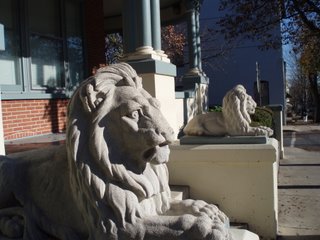I have just read
The Penelopiad. In it Margaret Atwood amusingly retells the story of Odysseus's faithful wife in her own words. The time is now. The location is Hades, the fields of asphodel. After millenia as a shade, Penelope is still jealous of gorgeous, selfish, vain Helen. She's still angry for a lifetime of mistreatment and increasingly irritated at mythological misinformation about herself. We hear all about the dishonest nature of wily Odysseus, how she often saw through his tricks, and how much less savory he was in "reality" than in Homer's version. As a shade, she knows all about Homer's version and all the subsequent versions.
Penelope doesn't like her life in Hades much; however, she resists rebirth. In contrast, since his death Odysseus has been "a French general, he's been a Mongolian invader, he's been a tycoon in America, he's been a headhunter in Borneo. He's been a film star, an inventor, an advertising man." (p. 189-90)
My favorite quote from poor Penelope: "More recently, some of us have been able to infiltrate the new ethereal-wave system that now encircles the globe, and to travel around that way, looking out at the world through the flat, illuminated surfaces that serve as domestic shrines. Perhaps that's how the gods were able to come and go as quickly as they did back then -- they must have had something like that at their disposal." (p. 19)
It's a good fun read -- far less challenging than many books by Atwood.
As I read I began to think how many authors have loved to retell old stories in new ways and forms: classic stories from mythology, Arthurian legend, Shakespeare, etc. Some retellings are straightforward; others, like
West Side Story, reuse the essential plot in modern dress. The best, like Atwood's tale, refocus from the point of view of a minor or underdeveloped character. The goal may be irony, politics, or curiosity.
My mind exploded with examples:
- Virgil wrote the Aeneid to create a Roman founder myth based in the Trojan war.
- A Connecticut Yankee in King Arthur's Court provided Mark Twain with ironic distance from the follies of his own era.
- Jean Rhys wrote Wide Sargasso Sea to recreate the first Mrs. Rochester. (She's not the only one to write a story based on this unloved madwoman.)
- Anita Diamant's best seller The Red Tent tried a historic-anthropological take on women in early biblical times through the character of Dinah.
- Wicked, first a novel, later a hit musical, devised a new adults-only personality for the Wicked Witch of Oz. (Author Gregory Maguire has subsequently redone several other children's stories in the same vein.)
- An older Broadway success is The Skin of Our Teeth -- Thornton Wilder mines the Bible. Cute and universal. Now material for high school drama clubs.
- In a heavier spirit, Par Lagerkvist created an identity for the crucified thief of Golgotha in Barabbas. (I think this blip has left the radar screen.)
- Aldous Huxley offered a distopian version of The Tempest in Brave New World.
- And I can't forget Hollywood's homage to Emma, the movie Clueless.
After winning a lawsuit about copyright, Alice Randall's The Wind Done Gone -- same story, slave's point of view, Gone With the Wind -- dropped out of sight like a stone. I've never read either book. But I've read/seen all the others on this list. And I know there are lots more, such as at least two more recent retells borrowing characters from Jane Austen novels.
The lawsuit proved that this kind of book isn't a crime. Is it a genre? I don't know.












